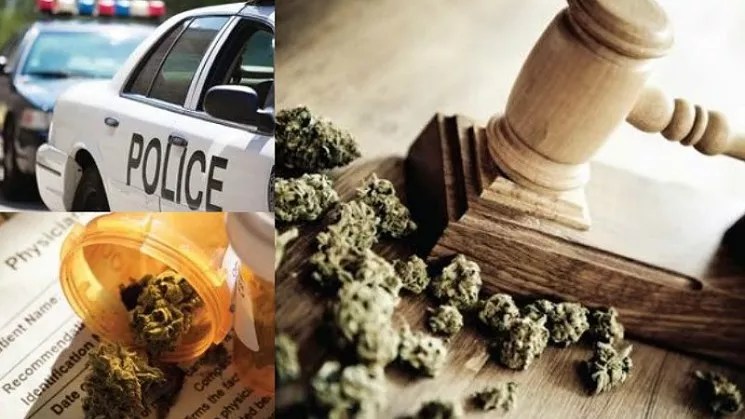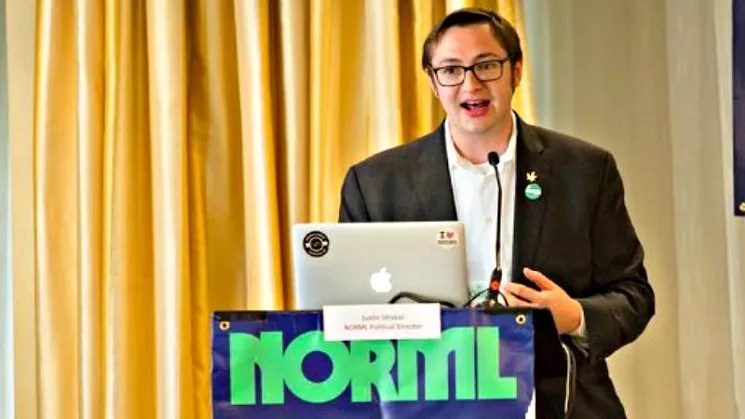

Audio By Carbonatix
Even as the National Organization for the Reform of Marijuana Laws, or NORML, is working with the office of Colorado Senator Cory Gardner to craft legislation designed to protect states that have legalized cannabis sales from federal interference, the organization is making a new push to have marijuana removed from the Controlled Substances Act, a process known as de-scheduling.
Exhibit A: In recent weeks, NORML submitted over 10,000 written requests that marijuana be de-scheduled to the U.S. Food and Drug Administration, which had asked for comments in conjunction with a review of cannabis’s international classification currently being conducted by the World Health Organization.
This hardly represents a change for NORML, whose political director, Justin Strekal, notes that “we’ve long maintained that it’s imperative to remove marijuana from the Controlled Substances Act, given that it’s a disproportionate policy response.”
The U.S. Department of Justice page devoted to the Controlled Substances Act explains that the placement of substances within the CSA’s five schedules is “based on whether they have a currently accepted medical use in treatment in the United States, their relative abuse potential, and likelihood of causing dependence when abused.” We’ve included the latest roster at the bottom of this post – but marijuana is listed alongside narcotics such as heroin, LSD, peyote and ecstasy, all of which are designated as having “no currently accepted medical use in the United States.”
Right now, there are multiple bills in Congress calling for marijuana to be de-scheduled, including the Marijuana Justice Act of 2018, sponsored by California Representative Barbara Lee and co-sponsored by, among others, Colorado rep and gubernatorial candidate Jared Polis, and the Ending Federal Prohibition Act of 2017, put forward by Virginia Representative Tom Garrett and Hawaii rep Tulsi Gabbard. In addition, Strekal points out, “On 4/20, Senator Chuck Schumer, the Democratic minority leader, announced his intentions to file a decriminalization bill as well. And if we compare this to the end of alcohol prohibition, that’s a reasonable response to take. The best thing the federal government can do is get out of the way of states that are implementing policies for their own constituents.”

NORML political director Justin Strekal.
He adds, “One thing I like to point out is that alcohol isn’t necessarily federally legal. It’s just not federally prohibited. There’s an excise tax for states that choose to regulate alcohol, but to this date, we still see a few dry counties dotting the landscape. De-scheduling would do nothing to prohibit states from maintaining marijuana prohibition. Should the residents of Utah demand of their policy makers that they continue to prohibit the sale of marijuana, the State of Utah would be free to do so. But it would no longer infringe on the rights of people in Colorado or other states that have now legalized it.”
Regarding the comments provided to the FDA, Strekal says, “We sent one email to a list and asked people to join us in making this submission, and we also shared it through social media – and more than 10,000 people took the time to take part. There was some template language, but a lot of people added their own personal stories about how they’ve been hurt through prohibition. Many of them have been saddled with criminal records, which has made their lives much more difficult. And we also heard from medical patients who recounted how cannabis has helped alleviate their suffering from cancer, MS, chronic migraines, anxiety, chronic depression, etc.”
Of all the comments about marijuana received by the FDA, nearly 60 percent were submitted via NORML. But there’s plenty of evidence that acceptance of marijuana is growing, including a recent Quinnipiac University poll that showed respondents behind legalizing marijuana by a 63 percent-33 percent margin – the highest ever recorded by the institution. Yet Strekal warns against activists assuming that marijuana will inevitably be de-scheduled as a result of such support.
“Democracy isn’t a spectator sport,” he emphasizes. “The reason we’re seeing multiple pieces of legislation for de-scheduling at the federal level, and more and more states moving toward state-level reform, is because of the pressure created by advocates at every level. Now is not the time to let off the gas. Now is the time to floor it.”
Here’s the breakdown of the five Controlled Substances Act schedules:

Schedule I Controlled Substances
Substances in this schedule have no currently accepted medical use in the United States, a lack of accepted safety for use under medical supervision, and a high potential for abuse.
Some examples of substances listed in Schedule I are: heroin, lysergic acid diethylamide (LSD), marijuana (cannabis), peyote, methaqualone, and 3,4-methylenedioxymethamphetamine (“Ecstasy”).
Schedule II/IIN Controlled Substances (2/2N)
Substances in this schedule have a high potential for abuse which may lead to severe psychological or physical dependence.
Examples of Schedule II narcotics include: hydromorphone (Dilaudid), methadone (Dolophine), meperidine (Demerol), oxycodone (OxyContin, Percocet), and fentanyl (Sublimaze, Duragesic). Other Schedule II narcotics include: morphine, opium, codeine, and hydrocodone.
Examples of Schedule IIN stimulants include: amphetamine (Dexedrine, Adderall), methamphetamine (Desoxyn®), and methylphenidate (Ritalin).
Other Schedule II substances include: amobarbital, glutethimide, and pentobarbital.
Schedule III/IIIN Controlled Substances (3/3N)
Substances in this schedule have a potential for abuse less than substances in Schedules I or II and abuse may lead to moderate or low physical dependence or high psychological dependence.
Examples of Schedule III narcotics include: products containing not more than 90 milligrams of codeine per dosage unit (Tylenol with Codeine), and buprenorphine (Suboxone).
Examples of Schedule IIIN non-narcotics include: benzphetamine (Didrex), phendimetrazine, ketamine, and anabolic steroids such as Depo-Testosterone.
Schedule IV Controlled Substances
Substances in this schedule have a low potential for abuse relative to substances in Schedule III.
Examples of Schedule IV substances include: alprazolam (Xanax), carisoprodol (Soma), clonazepam (Klonopin), clorazepate (Tranxene), diazepam (Valium), lorazepam (Ativan), midazolam (Versed), temazepam (Restoril), and triazolam (Halcion).
Schedule V Controlled Substances
Substances in this schedule have a low potential for abuse relative to substances listed in Schedule IV and consist primarily of preparations containing limited quantities of certain narcotics.
Examples of Schedule V substances include: cough preparations containing not more than 200 milligrams of codeine per 100 milliliters or per 100 grams (Robitussin AC, Phenergan with Codeine), and ezogabine.